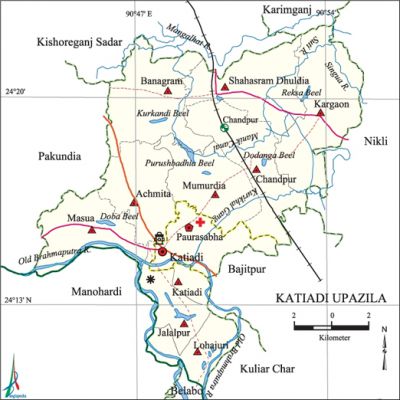Katiadi Upazila
Katiadi Upazila (kishoreganj district) area 219.21 sq km, located in between 24°10' and 24°22' north latitudes and in between 90°43' and 90°55' east longitudes. It is bounded by kishoreganj sadar and karimganj upazilas on the north, belabo and monohardi upazilas on the south, nikli, bajitpur and kuliar char upazilas on the east, pakundia upazila on the west.
Population Total 314529; male 151017, female 163512; Muslim 303458, Hindu 10957, Christian 21 and others 93.
Water bodies Main rivers: old brahmaputra, Mangalhat, Suti, Singura; Purushbadhia, Doba Kurkandi, Dodanga and Reksa beels are notable.
Administration Katiadi Thana was formed in 1897 and it was turned into an upazila in 1983.
| Upazila | ||||||||
| Municipality | Union | Mouza | Village | Population | Density (per sq km) | Literacy rate (%) | ||
| Urban | Rural | Urban | Rural | |||||
| 1 | 9 | 81 | 156 | 40725 | 273804 | 1435 | 48.2 | 39.5 |
| Municipality | ||||||||
| Area (sq km) |
Ward | Mahalla | Population | Density (per sq km) |
Literacy rate (%) | |||
| 19.32 | 9 | 20 | 40725 | 2108 | 48.2 | |||
| Union | ||||
| Name of union and GO code | Area (acre) | Population | Literacy rate (%) | |
| Male | Female | |||
| Achmita 09 | 5351 | 17421 | 18802 | 37.9 |
| Kargaon 47 | 8200 | 15237 | 16254 | 34.7 |
| Chandpur 28 | 6152 | 14476 | 16053 | 32.7 |
| Jalalpur 38 | 3236 | 11624 | 12685 | 40.9 |
| Banagram 19 | 6297 | 17035 | 18313 | 37.7 |
| Masua 76 | 4930 | 16084 | 17348 | 48.9 |
| Mumurdia 85 | 5432 | 13125 | 14340 | 36.9 |
| Lohajuri 66 | 3247 | 10831 | 11640 | 41.7 |
| Shahasram Dhuldia 95 | 6597 | 15524 | 17012 | 43.6 |
Source Bangladesh Population Census 2011, Bangladesh Bureau of Statistics.
Archaeological heritage and relics Tomb of Hazrat Shamsuddin (R), a companion of Hazrat Shahjalal (R) at village Kurikhai; Gopinath Jeu Mandir, Lakshmi Narayan Jeu Mandir (built during the time of Raja Navabanga Roy).'
War of Liberation The first group of freedom fighters of the upazila having formal arms training and carrying out operation against Pakistani soldiers had 36 members. The Pak army killed many innocent people of the upazila and also burnt their houses.
For details: see কটিয়াদী উপজেলা, বাংলাদেশ মুক্তিযুদ্ধ জ্ঞানকোষ (Encyclopedia of Bangladesh War of Liberation), বাংলাদেশ এশিয়াটিক সোসাইটি, ঢাকা ২০২০, খণ্ড ২।
Religious institutions Mosque 329, temple 2, tomb 2, akhra 2. Noted religious institutions: Kalamahal Jami Mosque, Kurikhai Dargah Jami Mosque, Katiadi Puratan Bazar Jami Mosque, Bethair Jami Mosque.

Literacy rate and educational institutions Average literacy 40.6%; male 40.6%, female 40.6%. Noted educational institutions: Katiadi Degree College, Dr. Abdul Mannan Mahila College, Achmita George Institution (1912), Nabagram Ananda Kishore High School (1922), Banagram Ananda Kishore High School (1912), Katiadi Pilot Boys' High School, Katiadi Pilot Girls' High School.
Newspapers and periodicals Monthly: Unmesh.
Main sources of income Agriculture 63.33%, non-agricultural labourer 3.48%, industry 0.94%, commerce 14.41%, transport and communication 2.28%, service 4.61%, construction 0.89%, religious service 0.20%, rent and remittance 1.41% and others 8.45%.
Ownership of agricultural land Landowner 53.97%, landless 46.03%; agricultural landowner: urban 34.21% and rural 54.85%.
Main crops Paddy, wheat, potato, sugarcane, jute, ground-nut, mustard, vegetables.
Extinct or nearly extinct crops Cotton, barley, sesame, kaun, linseed, aniseed, blackcumin.
Main fruits Mango, jackfruit, litchi, banana, papaya.
Fisheries, dairies and poultries This upazila has a number of fisheries, dairies and poultries.
Communication facilities Pucca road 119 km, semi-pucca road 11 km, mud road 395 km, railway 19 km, waterway 5 km.
Extinct or nearly extinct traditional transport Palanquin, horse carriage, bullock cart.
Noted manufactories Bidi factory 2, oil mill 4, incense factory 3, brick-field 1.
Cottage industries Weaving, potteries, bamboo work, blacksmith, wood work.
Hats, bazars and fairs Hats and bazars are 20, fairs 8, most noted of which are Katiadi, Dhukdia and Kargaon bazars, Rath Mela at Gopinath Jeo Temple and Sitala Mela.
Main exports Jute.
Access to electricity All the wards and unions of the upazila are under rural electrification net-work. However 37.8% of the dwelling households have access to electricity.
Sources of drinking water Tube-well 94.6%, tap 0.7% and others 4.7%.
Sanitation 34.3% of dwelling households of the upazila use sanitary latrines and 50.9% of dwelling households use non-sanitary latrines; 14.8% of households do not have latrine facilities.
Health centres Upazila health complex 1, family planning centre 8, palli satellite clinic 2.
Natural disasters The earthquake of 1918 caused heavy damages to settlements and other properties of the upazila. Besides, a large number of people were victims of the famine of 1943.
NGO activities Operationally important NGOs are brac, asa, proshika, Pratasha, Ahsania Mission, Palli Bikash. [Syed Md Saleh Uddin]
References Bangladesh Population Census 2001 and 2011, Bangladesh Bureau of Statistics; Cultural survey report of Katiadi Upazila 2007.
